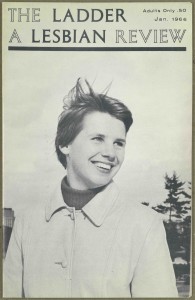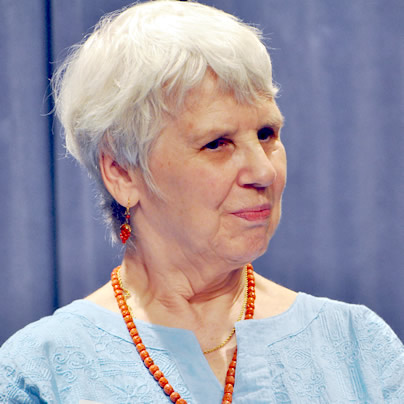
Oral histories are used to understand historical events, actors, and movements from the point of view of real people’s personal experiences.
In celebration of Pride Month this June, we are highlighting Arlington activist Dr. Lilli Vincenz, who has worked tirelessly throughout her life to support and advocate for members of the LGBTQ community in Arlington and beyond.
Dr. Lilli Vincenz came to the Washington, D.C., area in 1963 as a member of the Women’s Army Corps (WAC). During her time in WAC, Dr. Vincenz was outed as a lesbian and received a general discharge. After this, Dr. Vincenz found a community in LBGTQ activism.
She was notably involved with the Mattachine Society of Washington – a branch of the national Mattachine Society and also a significant local organization. She was one of the first lesbian members of the group and was the first editor of the organization’s newsletter, The Homosexual Citizen. In 1969, Dr. Vincenz and fellow activist Nancy Tucker co-founded an independent spin-off of the Mattachine newsletter, a publication called the Gay Blade, which later evolved into current gay news organization, The Washington Blade.
Dr. Lilli Vincenz appeared on the cover of a 1966 issue of The Ladder, an independent lesbian magazine. Image courtesy of the Library of Congress.
Dr. Vincez was also a filmmaker, capturing LGBTQ protests in real-time to preserve on film. In 1968, she made a short documentary called “The Second Largest Majority” about a Philadelphia picket protest. Though only seven minutes long, it captured signs and messages the protesters were expressing, creating a vivid portrait of the demonstration. Two years later, she made another film documenting participants in New York’s first Pride Parade, where people can be heard chanting “Gay and proud, gay and proud, gay and proud.” These clips have been featured in other documentaries about the gay rights movement, and both of these short works are available through the Library of Congress.
Dr. Vincenz also hosted a weekly open house for lesbian women from 1971 to 1979 where members of the community could gather. One regular attendee wrote a song about the gatherings:
“Come all you women in the D.C. vicinity / If loving women is your proclivity / Rev up your engine, roll up your bike / And point your wheels to Columbia Pike / Carlyn Springs to 8th Place; turn to the right / For Lilli’s open house on Wednesday night.”
Dr. Lilli Vincenz, date unknown. Image courtesy of The NLGJA.
In this audio clip, Dr. Vincenz shares her memories of protesting discrimination against gay and lesbian sexuality with the Mattachine Society.
Narrator: Lilli Vincenz
Interviewer: Diane Kresh
Interview Date: November 14, 2013
Transcript:
DK: Can you talk a little bit about the Mattachine Society?
LV: Oh, I loved it. Yeah. I went there immediate—and I felt so good. It was wonderful. I just loved it.
DK: Well, what did you love about it?
LV: I was free. And then the picketing started and I have that noted also in there. And it was so exciting that that was the most important thing for me. I’ve got to do this, because there’s all the lies that have been made for people who think that gay people are bad people socially. And well, nobody had really told people that it’s all right to be gay. But now, of course, we’re getting this quickly now that this—everywhere now we’re—
DK: Huge change.
LV: Another marriage, another marriage, they’re doing all that!
DK: Did you think that that would happen in your lifetime, those kinds of changes?
LV: Well, early on I didn’t think right away, but I only knew I had to be there. I had to do it, because so few people could do it. And I felt that I could do it.
In 2013, the Library of Congress acquired the Lilli Vincenz Papers, which includes journals, speeches, writings, interviews, and other documents relating to the life and work of Dr. Vincenz in the collection. In 2019, Dr. Vincenz was inducted into the LGBTQ Journalists Hall of Fame by the National Lesbian and Gay Journalists Association for her contributions to journalism and the gay rights movement.
For more information about Lilli Vincenz, see the Lilli Vincenz collection at the Library of Congress.
This Oral History is a repurposed post from June 15, 2017. It includes additional information about Lilli Vincenz, as well as an additional photo.


Those Wednesday night meetings wwre wonderful